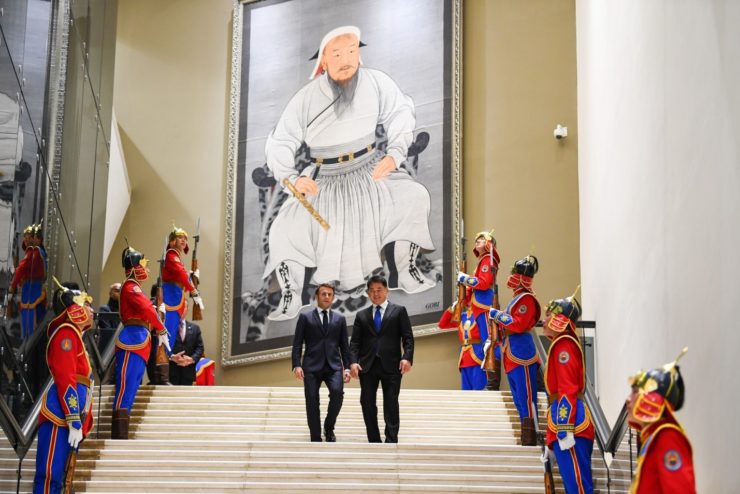
On May 21, 2023, the first official visit of the President of France to Mongolia in the almost sixty-year history of relations between the two countries took place. The visit was accompanied by a number of “rituals of respect” – in particular, a solemn ceremony in the main square of Ulaanbaatar, as well as a trip by the French leader to the Genghis Khan Museum. At the end of the visit, a joint declaration was presented and the desire of the countries to achieve the level of “comprehensive strategic partnership” in bilateral relations was expressed.
Such “surprises” occur in Mongolian practice more and more often – as Jarantai Myadagbadam notes, in recent years the number of foreign visits to Mongolia of the highest and high levels has increased up to four times – primarily due to the so-called “third neighbors” of Mongolia – the developed countries of the West. Since the beginning of the year, the US Secretary of State and the President of Poland have visited the country, and the President of Mongolia had a telephone conversation with the President of Ukraine.
The agenda of Macron’s visit, it seems, included literally everything – from cooperation in the field of mining to energy, the fight against epidemic threats, climate challenges, cooperation in space exploration and the creation of centers for learning the French language. But keep in mind that Macron’s visit took place immediately after the end of the G7 meeting in Hiroshima, Japan. It is obvious that the President of France informed the Mongolian leadership of the theses agreed by the leaders of Western countries a few days earlier. In particular, Macron’s press service noted “the desire of the head of state to reduce the pressure exerted by Russia on its neighbors and provide them with the opportunity to choose.” Furthermore, Macron stated that “he shared with the President of Mongolia his desire to provide assistance to a country that had been subjected to an external attack.” A very lengthy formulation with an unambiguous message, however, did not receive any response during the speech of the Mongolian leader following the visit. Macron also actively told his Mongolian counterpart about the humanitarian and economic consequences of the Ukrainian crisis.
Nevertheless, the Mongolian side most likely considered it necessary to leave out the theses of the President of France related to the Ukrainian crisis from the text of the “joint declaration.” Despite Macron’s repeated “references” to this issue in his speeches during the visit, none of the 18 points of the joint declaration reflected any of them. The parties mentioned, as is traditional for joint international declarations with the participation of Mongolia, their “concern about the situation and commitment to the principles of a peaceful settlement in accordance with international law.”
On a separate note, Macron paid attention to the intensification of the work of French companies on the development of uranium deposits in Mongolia. He clearly promoted the interests of the French corporation Orano SA. In addition, this could be linked to the desire of the European Union to diversify its imports of natural resources necessary to achieve “carbon neutrality” – in particular, uranium needed for nuclear power plants (France is the world leader in terms of the share of nuclear energy in the national energy mix), as well as lithium used in batteries, and various rare earth elements. At present, the EU countries are significantly dependent on the supply of these resources from China and are striving to find new suppliers – even with such politically and geographically complex logistics as Mongolia. Also, the “joint declaration” mentions the desire of the two countries to accelerate the signing of an agreement on investments and distribution of shares in the project for the development of the Zuuvch-Obo field by Badrakh Energy. It was discovered only a decade ago and is one of the largest uranium deposits in the country – its reserves are estimated at 100 thousand tons. Two-thirds of the shares of the contractor company belong to the same French company Orano SA.
The French-style “decarbonization” was also proposed to Mongolia – for example, the parties discussed in general terms the possibility of creating a nuclear power plant in Mongolia.
Thus, Macron sought to “work through” two areas of bilateral relations in Mongolia – inducing the Mongolian leadership to renounce neutrality on the Ukrainian issue, and promoting French uranium mining projects in Mongolia. They are both directly linked to the blatantly anti-Russian and anti-Chinese policies of Western countries – if the numerous references to the Ukrainian crisis were designed to motivate Mongolia to share the position of its “third neighbors,” the intensification of interest in mining in the country is dictated by the desire of France and the EU as a whole to reduce their dependence on Chinese supplies of key resources for the “green transition.” Both directions seem adventurous from the outset: maintaining neutrality on the Ukrainian issue seems unshakable and optimal for Mongolia, as any deviation from it will only be fraught with an increase rather than weakening (in Macron’s logic) of the pressure exerted on the country by its direct neighbors, while the EU’s “liberation” from imports of valuable metals from China by increasing their production in Mongolia inevitably involves the need for direct involvement of Russia and/or China in ensuring their transit to Europe. It seems that the French leader has set himself two contradictory objectives.
Based on these inferences, Macron’s visit to Mongolia is indicative of the West’s increasing struggle for “potential partners,” or at least “sympathizers” of its vision of the world order. The prospect of finding such a partner in Mongolia remains very dim.
Boris Kushkhov, the Department for Korea and Mongolia at the Institute of Oriental Studies of the Russian Academy of Sciences, exclusively for the online journal “New Eastern Outlook.”
